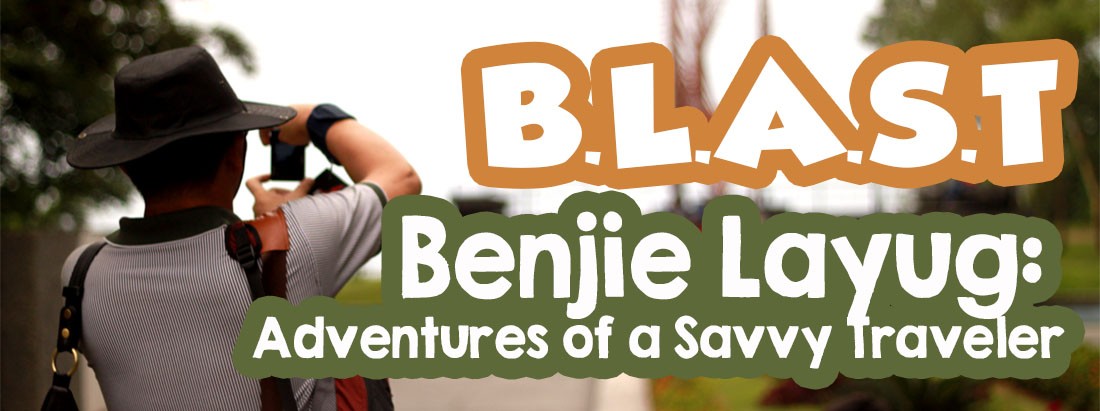Part of the Sophia’s Garden Resort-sponsored tour
We all woke up 4 AM early in the morning as we were to slated to experience one of Coron’s as well as the country’s popular eco-tourism attractions – the 3,760-hectare Calauit Safari Park. Formerly known as Calauit Game Preserve and Wildlife Sanctuary, it would be the closest we would get to an African safari.
Check out “Calauit Island Game Reserve and Wildlife Sanctuary“
It was still raining when we all boarded our van (4:30 AM) for our 2-hour drive to Macalachao Pier in Salvacion, Busuanga, arriving there by 6:30 AM. The pier has a souvenir shop selling really beautiful Calauit T-shirts. Here, we all had our packed breakfast before proceeding on our short, 10-minute motorized boat ride to Calauit Island.
This would be my second visit to this island, the first happening nearly 25 years ago (February 25, 1995 to be exact) with my mother and sister Tellie. We went there all the way by a motorized outrigger boat from Club Paradise Resort in Dimakya Island.
Located just off Busuanga Island’s northwestern coast, this park was established on August 21, 1976 by Presidential Proclamation 1578 issued by the late Pres. Ferdinand Marcos and opened to tourists since 1985. To transform it into a savanna, the island residents were relocated and its bamboo forests were cleared to provide a suitable environment for the animals.
Upon arrival, we were all requested to sign up on the registration area of the Information Center and, from here, we walked a short distance (the tour truck, the park’s safari vehicle, wasn’t available), accompanied by our local guide Orlando “Orlan” Cruz, to where the animals grazed. It had stopped raining by then.
At the time of my 1995 visit, the park still had 8 species of herbivores from northern Kenya (Africa) comprising 43 Reticulated Giraffe (Giraffa camelopardalis reticulata), 78 Grévy’s zebra (Equus grevyi) and 6 types of antelopes – 155 Impala (Aepyceros melampus), two Thomson’s gazelle (Eudorcas thomsonii), 122 Waterbuck (Kobus ellipsiprymnus), 50 Common Eland (Taurotragus oryx), 14 Topi (Damaliscus lunatus jimela) and 16 Bushbucks (Tragelaphus sylvaticus).
Since my first visit, the original individuals imported from Africa have all died, leaving behind only the offspring of the Reticulated giraffes, Grevy’s zebras, waterbucks and common elands (the Thompson gazelles, bushbucks topis and impalas have all died because of infighting and poaching), which were all born in Calauit.
Of the remaining four species, we only spotted some the 24 zebras and the 32 giraffes (the 14 waterbucks and elands are shy and prefer to distance themselves from tourists). The giraffes, captivating us with their magnificent colors, stood tall in full regal and charm while the zebras, with their black and white stripes, looked so classic.
The highlight of the tour was the Feeding Station. Here, within an enclosed pen, we got to feed the giraffes with leaves from the bakawang gubat or malwandit (Carallia borneensis) provided by Orlan and got up close to them, something I wasn’t allowed to do during my first visit.
This was my first time close encounter with this graceful and beautiful animal, among the iconic and the tallest land animal in the world. The giraffes have names such as Isabel (the biggest giraffe of the lot), Miller, Terrence and Mylene, all named after their sponsors.
Though the giraffes and zebras are the crowd favorites, there were other animals in the sanctuary too. We also saw local, critically-endangered Calamian Deer (Hyelaphus calamianensis) grazing with the giraffes and zebras.
We also observed, in their pens, pools and cages in the mini zoo, the Philippine crocodile (Crocodylus mindorensis) , the Philippine porcupine (Hystrix pumila) , freshwater turtles, reticulated python, leopard cats, the Palawan bearded pig (Sus ahoenobarbus) and the Philippine macaque.
There was also a tree they called the camouflage tree because it looks like the camouflage uniform of servicemen.
Today, the park now faces a number of challenges. The number of workers in the park has dwindled from 300 to 30 dues to budget cuts. The former inhabitants (mostly from tribes of Tagbanwas) of the peninsula who were relocated decades ago are returning via the Balik-Calauit movement. Currently, The provincial government is still reaching out to settle the disputes between the locals and the authorities in the park.
Calauit Safari Park: Brgy. Salvacion, Busuanga. Mobile number: (0926) 114-4443 (Mr. Froilan Sariego – park manager). Admission: PhP200 (Filipinos) and PhP400 (foreigners). Use of tour truck: PhP1,000/2 hours (divided by how many you are in the group, maximum capacity is 20 pax). Feeding time of the giraffes is from 7 -9:30 AM. The Calauit Office is closed on Saturdays and Sundays and all tours desired to be taken from Saturday to Monday mornings should be reserved by Friday afternoon. All reservations received later than Friday afternoon will be confirmed Monday morning at 10 AM.
Sophia’s Garden Resort: 5 Dinagpan Rd., Sitio Jolo, Brgy. Poblacion 5, Governor’s Dr., Coron, 5316 Palawan. Tel: (048) 723-1871. Mobile numbers: (0917) 543-5775 and (0939) 915-0274. E-mail: sophiasgardenresort@gmail.com. Website: www.sophiasgardenresort.com. You can also follow them on Facebook: Sophia’s Garden Resort





















